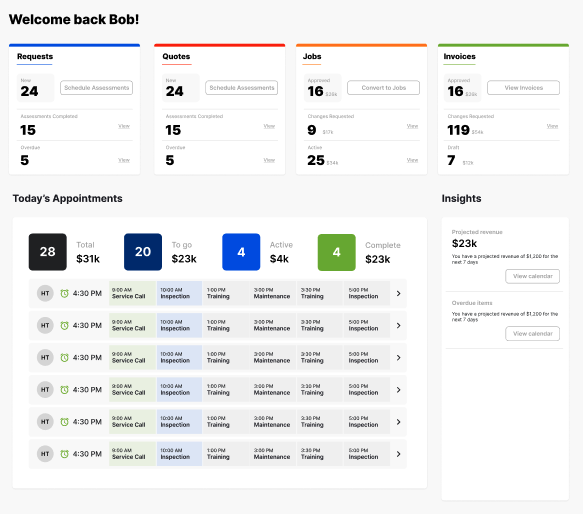Importance of FSM Software in Today's Business Landscape
In today's business landscape, with its diverse workforce and intricate operational demands, organizations increasingly adopt field service software to maintain a competitive edge. This specialized software and accompanying mobile apps—like Flowcrave, are crafted to optimize communication channels, automate scheduling tasks, and streamline the flow of information between field staff and the central administrative hub.
Duration:
Published on February 28, 2024
Field Service Software: Definition and Components
Field Service Management (FSM) software facilitates the coordination of a company's field resources, encompassing tasks such as scheduling and dispatching workers, contract management, data sharing, and reporting. Key components typically include:
- Field service scheduling capabilities are essential for managing service appointments, timelines, and shift schedules efficiently. Leading software harnesses AI to prioritize service calls and optimize even the most intricate scheduling tasks.
- Dispatch management features streamline the process of dispatching service personnel for work assignments, ensuring prompt and effective response to service requests.
- Parts management functionality helps maintain an adequate inventory of parts and spares, ensuring that field technicians have access to necessary resources when needed.
- Service reports and invoicing features simplify tasks such as creating on-site service reports and automatically integrating invoices into ERP systems for seamless billing processes.
- Field service metrics, analytics, and real-time reports enable teams to swiftly identify issues and make informed decisions to resolve them, ensuring compliance with service level agreements (SLAs).
- Mobile and desktop reporting provides a centralized view of customers, products, and service staff, facilitating streamlined field service processes. Top-tier software offers support for desktop, mobile, and offline dashboards and graphical reports.
- Augmented and virtual reality technology enhances field technicians' capabilities by providing visual guidance from remote experts, enabling them to complete tasks efficiently and safely.
- Integration with ERP and other systems ensures seamless management of assets, contracts, and other elements crucial for effective field service management.
What Are the Benefits of Field Service Management Software to Your Service?
Field Service Management (FSM) software holds a pivotal role for various asset-centric companies. It serves as a fundamental tool for optimizing operations, particularly for businesses with field operations. By harnessing FSM software, companies can streamline their processes and elevate the quality of customer experience they deliver. The primary objectives of field service software are twofold:
FSM software empowers businesses to make the most of their available resources, ensuring efficient allocation and utilization.
By streamlining operations and improving service delivery, FSM software helps companies maximize customer satisfaction, meeting the rising demands of today's consumers.
As customer expectations continue to evolve, the advantages offered by FSM software become increasingly crucial, particularly for organizations operating in competitive industries.
- Reduced Operations Cost: Field service software significantly reduces operational expenses by optimizing workforce and resource utilization and automating manual tasks. This dual approach maximizes efficiency and minimizes costs.
- Streamlined Data Entry: Field service applications eliminate the need for manual data entry by automating tasks like appointment scheduling, technician productivity tracking, and report generation. This not only saves time and money but also reduces the likelihood of human errors.
- Enhanced Field Team Productivity: Digital applications empower field technicians by providing easy access to essential data such as SLAs, warranties, contracts, and payment history. With a centralized repository for customer information, technicians can work more efficiently. Additionally, organizations can monitor technician productivity and schedule appointments more effectively, ensuring optimal performance in the field.
- Improved Job Scheduling and Dispatch: Field platforms offer advanced capabilities for task dispatch and scheduling, allowing businesses to assign jobs based on technician availability and proximity to the job site. This minimizes delays and ensures timely completion of tasks.
- Automated Processes and Workflow Optimization: Field applications automate various tasks including appointment scheduling, billing, and client communications. This automation streamlines workflows, allowing businesses to focus on core activities while saving time on administrative tasks.
- Improved Communication With Customers: Field management solutions enable businesses to enhance customer communication by automating appointment updates and reminders. They also facilitate monitoring of customer satisfaction and the generation of comprehensive reports, helping companies identify areas for improvement in their customer service.
- Real-Time Tracking of Technician Work: Utilizing GPS tracking, businesses can monitor the whereabouts of field personnel in real-time. Online solutions offer instant visibility into job statuses and performance, allowing for adjustments to schedules as needed. Additionally, client apps inform customers of technician arrival times, enhancing transparency and customer satisfaction.
- Enhanced Team Coordination: Field management solutions replace outdated paper-based systems and phone calls with centralized platforms for job assignment and dispatch. Real-time updates from technicians ensure everyone stays informed, while mobile apps provide technicians with all necessary job details and allow for easy clock-in/out and status updates.
- Error Reduction: Field service software helps businesses reduce errors and improve accuracy by establishing standard operating procedures (SOPs) for tasks. This ensures consistent and high-quality job completion, boosting customer satisfaction and confidence in the service provided.
- Optimized Service Request Collection: Field service management software streamlines the process of collecting and handling service requests from initiation to resolution. This efficiency enables businesses of all sizes to swiftly address client complaints and concerns, improving overall service delivery.
Who truly benefits from field service management software? The answer is simple: anyone looking to enhance their business's efficiency and productivity. Whether you're a small startup or a large corporation, integrating digital tools can revolutionize how you manage your field operations.
From automating tasks and streamlining workflows to improving customer satisfaction and boosting revenue, the impact is significant. Now that you understand the transformative potential, it's time to take proactive steps and invest in field service management software—one of the best software you can utilize is Flowcarve—complete sets of features and tools you can use for your field service business. This strategic decision ensures you stay ahead of the competition and propel your success to new heights!
